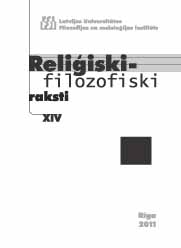„Dievturības pionieris” vai luterāņu draudžu darbinieks?Ieskats Jura Leca dzīvesgājumā un domu pasaulē
Pioneer of Dievturība or Lutheran Lay Leader? The Life and Thoughts of Juris Lecs
Author(s): Agita MisāneSubject(s): Christian Theology and Religion
Published by: Latvijas Universitātes Filozofijas un socioloģijas institūts
Summary/Abstract: Juris Lecs (1860–1935) is commonly considered to be one of the pioneers or forerunners of Dievturība, the Latvian Pre-Christian revivalist movement. This is due to a tradition established by Ernests Brastiņš, movement’s leader in the twentieth and thirties of the XXth century. However, a closer look at his biography and publications disclose a more complex picture. The aim of this chapter is to correct the above commonly held error. During the World War I, Lecs lived and worked in Luga, St Petersburg region. This is where his pamphlets Aryans-Latvians (1914) and The Old-Latvian Faith and the Everyday Beauty of Their Soul (1917) were written. Lecs returned to Latvia in 1918 and settled in Jelgava where he worked as a teacher and later became the local branch manager of the National Bank of Latvia. He was also the elder of the St Nicholas Lutheran parish and, in 1919, became the first ethnic Latvian pre- sident of the Courland’s Lutheran Church Consistorium. His religious activities and high leadership positions in the church discredits the idea of him being involved in Pre-Christian activities of any kind and the foundation of a non- Christian congregation (as Brastiņš wrote) in particular. At the same time, Lecs retained an amateur interest in prehistory and Pre-Christian religion of the Latvian people. He was a follower of the Urmonotheismus theory and believed that the ancient Latvian faith was protomonotheistic and, hence, he did not see any principal difference between his vision of it and Christianity. One of his aims was to prove that Latvians and Lithuanians are the proto Indo-European peoples from whom all other Indo-European or Aryan nations have originated.
Journal: Religiski-filozofiski raksti
- Issue Year: XIV/2011
- Issue No: 1
- Page Range: 131-142
- Page Count: 12
- Language: Latvian

